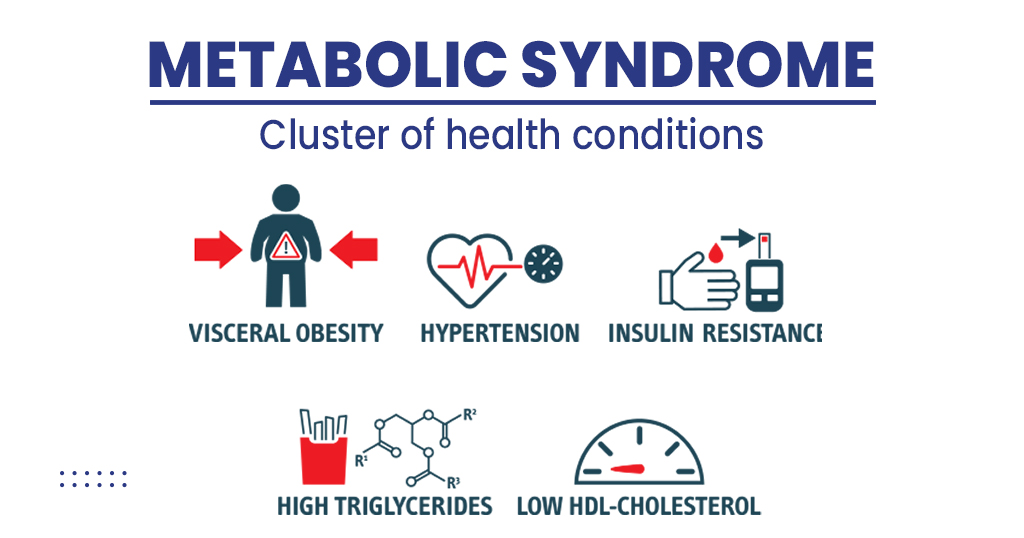What’s the relation between Metabolic syndrome and ED?
Summary
Erectile dysfunction (ED) is characterized by an inability to maintain an erection sufficient for a satisfactory sexual encounter. The metabolic syndrome is a constellation of symptoms that increases the risk of heart disease in patients. Studies have linked the metabolic syndrome to ED.
The presence of ED is an important indicator that a patient may be at risk for a cardiovascular event within five years of onset. In the same way, metabolic syndrome has multifactorial causes, so it may also have multifactorial effects on erectile function. The purpose of this blog is to review on how metabolic syndrome and its components are associated with ED. Also, whether interventions targeted at improving metabolic syndrome components can improve the condition.
Introduction
A man with erectile dysfunction (ED) is unable to achieve and/or maintain an erection sufficient for satisfactory sexual performance. ED is the most commonly treated sexual dysfunction in men worldwide. It is found in 15% of men between 40 and 50 years old. Also in 45% of men between 60 and 70 years old, and 70% of older men.
The association between ED and cardiovascular disease (CVD) has been documented for the past decade. It may be difficult to establish causality, but ED appears to be an indicator of systemic disease, with both ED and CVD arising from the same cause.
What is Erectile dysfunction?
Erectile dysfunction is basically a disorder found in men which could be a sign of physical or psychological condition. The symptoms associated with this disorder is found in men’s reproductive organ i.e. inability to keep an erection firmer and longer enough during a sexual activity.
There are many men who experience erectile dysfunction occasionally because of stress, fatigue, alcohol, or emotional issues, but 25% of men have recurring episodes of the disorder. People dealing with erectile dysfunction will be:
- Unable to achieve erection at anytime needed.
- might achieve erection sometime but not when needed like during sexual activity.
- might able to achieve erection when needed but not long enough
What is Metabolic Syndrome?
A metabolic syndrome is a collection of conditions that occur together, increasing your risk of type 2 diabetes, heart disease, and stroke. A number of conditions are associated with obesity, including high blood pressure, high blood sugar, excess body fat around the waist, and abnormal cholesterol or triglyceride levels.

The presence of just one of these conditions does not necessarily indicate metabolic syndrome. It does, however, increase your risk of serious diseases. In addition, if you develop more of these conditions, you face a greater risk of complications, such as type 2 diabetes and heart disease.
Link between ED and Metabolic syndrome
Metabolic syndrome has attracted considerable attention as a result of its increasing association with various pathophysiologic conditions, including heart failure, type 2 diabetes, and erectile dysfunction. It has been shown in numerous studies that various components of the Metabolic syndrome are directly correlated with ED.
Additionally, an independent association between components of Metabolic syndrome and ED was found in the study. Kupelian et al. showed that even at a BMI of 25, Metabolic syndrome is associated with an increased ED risk (relative risk = 2.09) using data from the Massachusetts Male Aging Study.
An analysis of adult participants in the 2001–2004 National Health and Nutrition Examination Survey revealed an association between poor glycemic control, impaired insulin sensitivity, and the Metabolic syndrome and an increased risk of ED.
Conclusion:
To prevent or control the epidemic trend of the Metabolic syndrome and its consequences, strategies must be developed. Identification and treatment of at-risk individuals early could aid in the improvement of ED and secondary cardiovascular disease, such as weight management, lifestyle changes, and physical activity. There have been several studies that have demonstrated the effectiveness of the intervention. In a recent study, Esposito et al. found that a Mediterranean-style diet is beneficial in reducing the prevalence of ED in men with Metabolic syndrome, as it is rich in whole grain, fruits, vegetables, legumes, walnuts, and olive oil.
REFERENCES:
- https://www.ncbi.nlm.nih.gov/pmc/articles/PMC5313297/
- https://www.ncbi.nlm.nih.gov/pmc/articles/PMC6711110/
- https://www.sciencedirect.com/science/article/pii/B9780128197653000145
- https://diabetesjournals.org/care/article/28/5/1201/27760/High-Proportions-of-Erectile-Dysfunction-in-Men
- https://journals.lww.com/indjem/Fulltext/2015/19020/Metabolic_syndrome__An_independent_risk_factor_for.14.aspx
- https://www.lidsen.com/journals/icm/icm-06-04-042
For more details, kindly visit below.